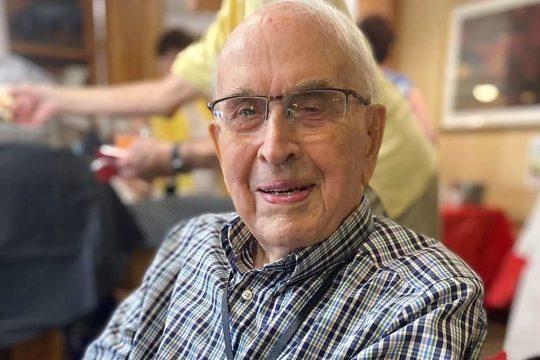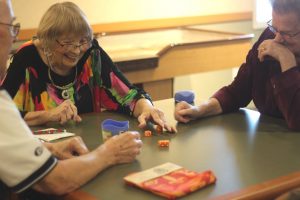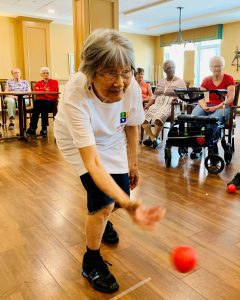
It is estimated that over 7 million people in Canada live with chronic pain. Impacting every area of health and wellness, adults aged 65 years and older are especially vulnerable to chronic pain related to neurodegenerative and musculoskeletal ailments.
A deeply personal experience, chronic pain – although often invisible – is now understood as a disease in its own right. Fortunately, there are a wide range of non-pharmaceutical strategies that can be effective in easing symptoms.
How does chronic pain affect seniors?
Pain is an unpleasant sensation and emotional experience usually caused by tissue damage. It allows the body to react to and prevent further tissue injury. While short-term pain typically heals, chronic pain lasts longer than three months, hurts most of the time, and gets in the way of things like daily activities.
One in five Canadians lives with chronic pain, impacting people of all ages, genders and backgrounds but, it highly impacts older adults. Chronic pain can contribute to poorly life quality, social isolation, impaired physical activity, and dependence to carry out daily activities.
7 Ways to Help Older Adults Manage Chronic Pain
 It’s not always possible to completely eliminate chronic pain. However, there are some ways older adults can effectively manage ongoing discomfort and enjoy a better overall quality of life.
It’s not always possible to completely eliminate chronic pain. However, there are some ways older adults can effectively manage ongoing discomfort and enjoy a better overall quality of life.
1. Find ways to stay active.
It may seem counterproductive to be more active when living with chronic pain but being too sedentary can weaken muscles and create new sources of discomfort. While it is understandably challenging to find ways to remain active, seniors with chronic pain may benefit from:
- Walking at a comfortable pace
- Water-based forms of exercise like water aerobics
- Low-impact or chair-based workouts like tai chi, dance, yoga, or Pilates
- A gentle movement program .
Commitment to regular activity is important, as these exercise programs are most effective when performed for at least 6 weeks.
2. Address other conditions that worsen pain.
Everyone’s pain is different, and there are many causes of worsening pain. Stress, depression, anger, anxiety or fear, unhelpful thoughts, isolation, underdoing and overdoing can create more pain signals in the body. Seniors may be able to control their stress levels when living with chronic pain by:
- relaxed breathing,
- passive or progressive muscle relaxation
- mindfulness
- Talk therapy
Speak with your health care provider if you notice difficulties with anxiety or depression.
3. Try hot/cold therapy.
Some older adults can manage chronic pain by taking advantage of heat and cold applications. Cold works by reducing inflammation within the affected area, while heat increases circulation and stimulates the body’s natural healing process. Cold can be applied with ice packs or cooling gel. Heat can be delivered with a heating pad, heating gel, or a warm bath or shower.
4. Get the sleep you need.
While it can be difficult to sleep when you have chronic pain, poor sleep can also worsen the experience. Good sleep hygiene, relaxation techniques, and a calming nighttime routine can improve sleep.
5. Drink more water.
Studies show that dehydration can increase your perception of pain and restrict blood flow through your brain. So, stay hydrated!
6. Distraction works wonders.
The ability to manage pain increases when seniors feel happy and are preoccupied with enjoyable activities. This is because joy and positivity can decrease the effects of pain signals in the body. To take the focus off your pain, listen to music, attend a We Can Build It or craft workshop, or engage in a social activity.
7. Pace yourself.
Doing too much or too little can increase pain. Daily planning with a balance of daily tasks, recreation and other responsibilities can help with structure and routine. Taking breaks before the pain level is too high can decrease the frustration that may happen with a flare.
National Pain Awareness Week in Canada
November 6-12, 2022 is National Pain Awareness Week in Canada, a time to raise awareness of chronic pain and its impact on Canadian seniors.
If you are experiencing chronic pain, the team at All Seniors Care will work collaboratively with you, your loved ones, and your care providers so you can continue to live independently.
Whether you’re interested in a retirement residence in Alberta, Manitoba, Ontario, Quebec, or senior living in Regina, our dedicated and knowledgeable staff will help you make the most of every day.
If you have any additional questions, give us a call at your convenience and we’ll be happy to chat. We also encourage you to check out our Instagram page for awesome pics and more health tips for seniors!
Writer – Julianna McLeod
Julianna is a health and wellness expert at All Seniors Care. Her mission is to create content that empowers seniors to form sustainable solutions for lasting health and happiness. She is an experienced writer, editor, and Recreational Therapist living in Toronto.